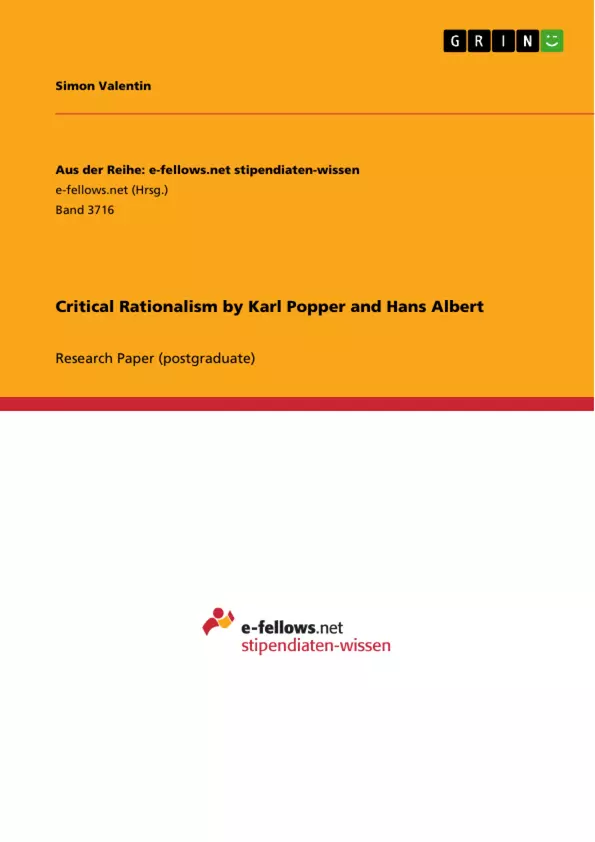This coursework aims to present critical rationalism and its great thinker Karl Popper as well as Hans Albert. However, this coursework place greater emphasis on Karl Popper as the founder of this school of thought. As a result, the scientific and theoretical foundations of this important school of thought is presented as well as its introduction to Popper's and Albert's explanations. The major currents of epistemology, which were decisive for the development of critical rationalism, are presented right after the introduction, which is part of the second section. Section three starts with Popper's identification of the induction and demarcation problem. Based on the basic problems of induction and demarcation, section four starts to set out the emerging critical rationalism following by a detailed examination of the methodology according to Popper, his theory of falsification, and Hans Albert as an important German representative. Finally, section five contains a critical appraisal and a conclusion.
Table of Contents
- Introduction
- Epistemology
- Rationalism
- Empiricism
- Positivism
- Context for the Development of Critical Rationalism
- Problem of Induction
- Demarcation Problem
- Critical Rationalism as a School of Thought
- Cornerstones of Critical Rationalism by Karl Popper
- Principle of Falsifiability
- Deductive Reasoning and Falsification
- Truth and Progress in Knowledge
- Contributions and Advancement by Hans Albert
- Cornerstones of Critical Rationalism by Karl Popper
Objectives and Key Themes
This coursework aims to present critical rationalism, a school of thought within epistemology and philosophy of science, with a focus on its founder, Karl Popper, and its prominent German representative, Hans Albert. The text examines the historical context of critical rationalism's development, explores its fundamental principles, and discusses its impact on various fields of research.
- The Problem of Induction and the Fallibility of Human Knowledge
- The Demarcation Problem and the Principle of Falsifiability
- Deductive Reasoning and the Method of Falsification
- Truthlikeness and the Progress of Knowledge
- The Applicability of Critical Rationalism to the Social Sciences
Chapter Summaries
The introduction sets the stage by introducing Karl Popper and his significant contribution to the field of epistemology with his seminal work, "The Logic of Scientific Discovery". The second section delves into different currents of epistemological reasoning, namely rationalism, empiricism, and positivism, highlighting their key concepts and prominent figures. The third section focuses on the problem of induction, a central issue in epistemology, and how it led to the development of critical rationalism. It also elaborates on the demarcation problem, which deals with distinguishing empirical science from other forms of knowledge, such as metaphysics and pseudoscience.
The fourth section introduces critical rationalism as a school of thought and its key principles. It examines Popper's central concept of falsifiability, emphasizing its significance for scientific progress. It also explores the method of deductive reasoning and falsification, outlining how it challenges traditional approaches to scientific inquiry. The section further delves into the notion of truthlikeness and the concept of corroboration, emphasizing their role in evaluating scientific theories. The final part of this section highlights Hans Albert's contributions to critical rationalism, particularly his application of the school of thought to the social sciences.
Keywords
This text focuses on critical rationalism, epistemology, philosophy of science, Karl Popper, Hans Albert, fallibilism, falsifiability, deductive reasoning, verisimilitude, corroboration, demarcation problem, induction problem, positivism, and the social sciences.
Frequently Asked Questions
What is Critical Rationalism?
Critical Rationalism is an epistemological philosophy founded by Karl Popper which holds that scientific theories cannot be proven true, but only falsified through rigorous testing.
What is the 'Problem of Induction' according to Karl Popper?
Popper argued that we cannot logically derive universal laws from singular observations; just because the sun has risen every day doesn't prove it will rise tomorrow. This led him to emphasize deduction over induction.
How does the Principle of Falsifiability work?
A theory is only scientific if it is falsifiable—meaning it must make specific predictions that could potentially be proven wrong by observation or experiment.
What was Hans Albert's contribution to Critical Rationalism?
Hans Albert, a prominent German representative, extended Popper's ideas to the social sciences and developed the 'Münchhausen Trilemma' regarding the foundation of knowledge.
What is the 'Demarcation Problem'?
It is the challenge of distinguishing between empirical science on one hand, and mathematics, logic, metaphysics, or pseudoscience on the other.
Does Critical Rationalism believe in absolute truth?
It views truth as an ideal that we can approach (verisimilitude), but because human knowledge is fallible, we can never be certain we have reached absolute truth.
- Quote paper
- Simon Valentin (Author), 2021, Critical Rationalism by Karl Popper and Hans Albert, Munich, GRIN Verlag, https://www.grin.com/document/986067



